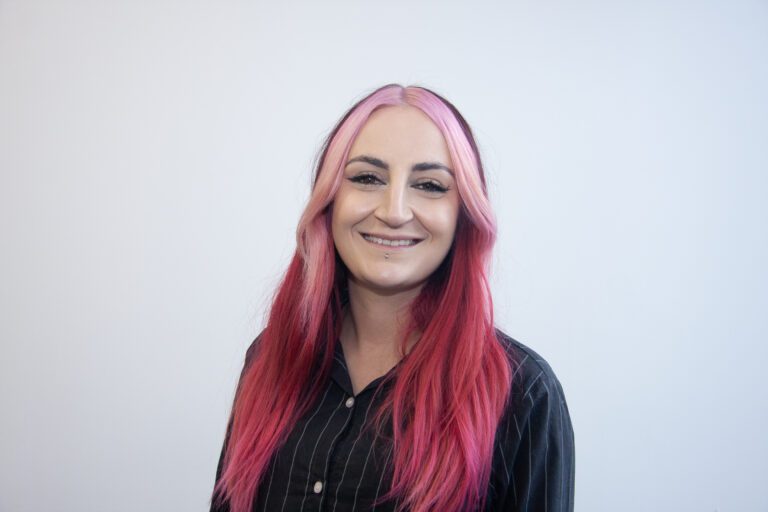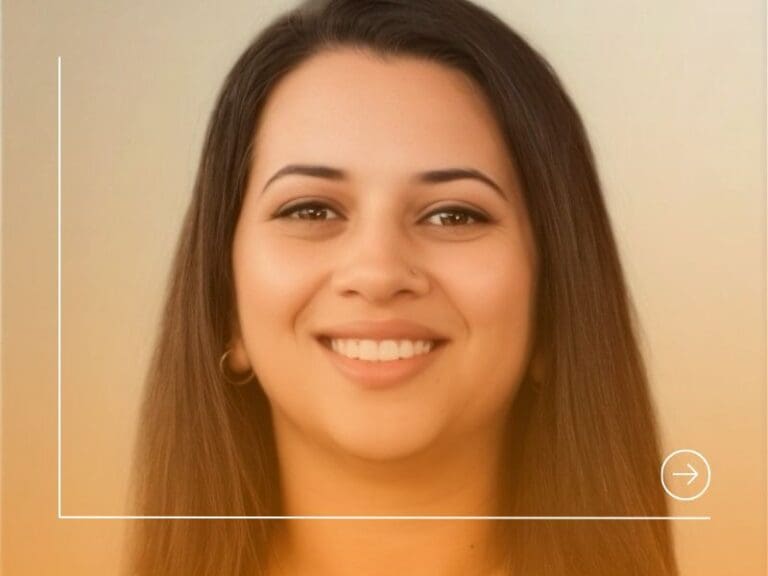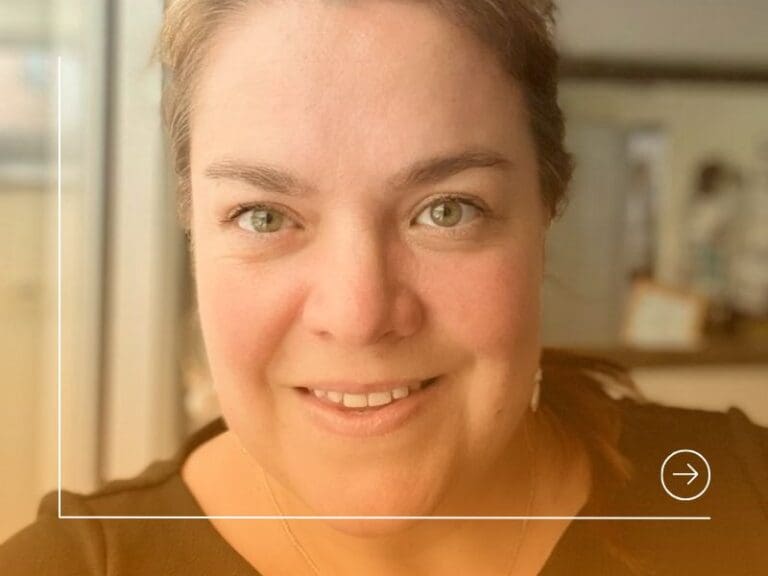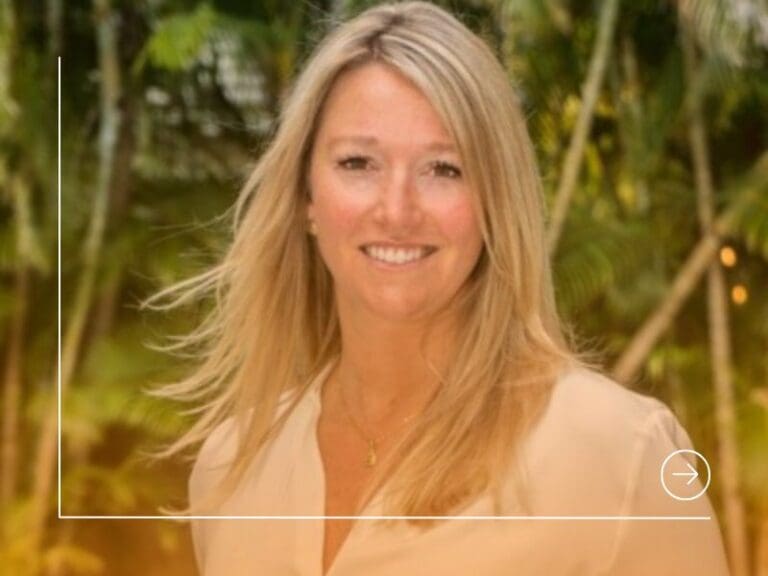Rose Ulldemolins is a Tech School Lead at Lloyds Banking Group, helping others to upskill in tech.
Six years ago, I took part in a reskilling program to be a Software Engineer and I’ve never looked back since! From there I’ve had various roles at Lloyds Banking Group, from a front-end engineer, to a full-stack engineer, to Engineering Community Lead and now my most recent role as Tech School Lead.
It’s my job to lead the Dundee Tech School, an exciting initiative where we offer training to new engineers to give them the skills, preparation and support that they need to have successful careers.
How did you land your current role? Was it planned?
I was taking part in a panel event for women in technology, talking about my experience of imposter syndrome, which was followed by a networking session. During this I was chatting to someone in the recruitment team at Lloyds, and we got talking about the vacancy for the Tech School Lead I’d seen online- which ended up being a perfect role to me.
Having been reskilled myself I am passionate about helping others to help them find the right careers, and in my role now I get to train up new engineers who are new to the industry- a perfect fit for me!
What are the key roles in your field of work, and why did you choose your current expertise?
This is the beauty of being a software engineer, there are lots of niches you can follow, even within Lloyds Banking Group there’s a whole host of roles available. For example you could be; a front-end engineer who works closely with designers to create what a customer see’s on an app or website; a security engineer ensuring our applications are safe and secure to protect our customers; or a quality engineer using code to test that our applications behave as they should.
I worked as a full-stack engineer which is building the applications in full- the part the customer sees, as well as connecting this up to a database- which I loved because you get to see the process end to end. The only part that was missing from me was the people side, I love technology, but I also love coaching and supporting others, which is why I moved from being an engineer, to being an engineering lead where I help others develop the skills they need to succeed.
Did you (or do you) have a role model in tech or business in general?
I’ve been lucky enough to have wonderful role models every step of the way. Reshmi McIntosh who founded Women ConnecTech (our gender diversity network at Lloyds Banking Group) has been a huge inspiration, mentor and friend to me, always encouraging me to achieve my best. She ran the first coding club I went to. I was also lucky enough to be sponsored by an Engineering Lead called Derek Smith to be reskilled as a Software Engineer, without both of these people I don’t think I would have had the courage to be where I am today.
Since then, I’ve had some great female role models in tech; my first Product Owner Amy McDaid; my Head of Department that followed, Lauren Wright; and my last manager Sara Milne. They were all inspirational people who believed in me even when I didn’t believe in myself. I can’t recommend getting a mentor or surrounding yourselves with good role models enough, it’s made a huge difference to my career.
What are you most proud of in your career, so far?
I’ve recently finished training up a cohort of 12 software engineers, and seeing them grow in confidence, technical ability and then go on to thrive in their teams has easily been my proudest moment. Being able to support others on a journey I’ve been on myself is something I’ll always be thankful for. It also led me to another proud moment of winning the ‘Digital Star’ at the Bupa everywoman in Technology Awards this year. I remember going to the same awards at the start of my career and looking up to all the incredible people winning those awards.
What does an average work day look like for you?
Whether its running sessions to teach the cohort new skills, or paired programming with them to help them solve their problems, or running the team meetings- every day in my current role looks different.
We’re now planning our exciting next cohort, where we’ll be taking on two brand new teams to look at gamification in our products. This is a mixture of recruitment activities and planning the curriculum for the next cohort alongside our external training provider, QA, and other colleagues at Lloyds Banking Group to ensure the training plan gives the new starters everything they need to thrive as a team.
Are there any specific skills or traits that you notice companies look for when you’re searching for roles in your field?
One thing that always stands out for me is when someone has worked on a personal project because it really illustrates your passion and self-drive- it makes you stand out from the crowd. For example, if you’re looking for a front-end engineer job, go and build yourself an application and link it on your CV – not only is it great experience to build something yourself, but it also shows employers how capable you are too.
Has anyone ever tried to stop you from learning and developing in your professional life, or have you found the tech sector supportive?
I’m incredibly lucky that the culture at Lloyds Banking Group is very much centred on learning and development. I could only study for my master’s whilst working full-time because I was given time to attend lectures during my working day, as well as the opportunity for other qualifications (for example in Cloud technology) that were funded by Lloyds Banking Group.
We have a whole team called the Chief Technology Office Skills & Community team (that my last role was in) who funds training courses for engineers, provides licenses for things like PluralSight and Codecademy to learn in your own time. They also run ‘Reboot’ which are day long learning events with a variety of talks, workshops and hackathons as well as organising virtual sessions on a variety of different topics throughout the year. This support and dedication to learning and developing is something that has hugely helped me in my career.
Have you ever faced insecurities and anxieties during your career, and how did you overcome them?
The honest truth is I always have, and probably always will – but that’s expected in a sector that’s always evolving and one where diversity is still improving. My first day as a Software Engineer I went outside and cried, because I just didn’t feel like I was good enough, or that I fitted in. Looking back that was my own insecurities, because I’ve always been surrounded by supportive people who have got me through those difficult days. I think that’s key – get yourself a mentor who can be your cheerleader on days that you can’t be your own. The way we talk to ourselves is powerful and can even trick our brain into believing it! When you tell yourself you can’t do something you plant a seed of doubt, and every time after that if someone else makes you feel like you can’t, you water that seed and it continues to grow. I was once told every strength casts an equal shadow, so I try and flip that around. For example, I used to see not having a computer science degree as a weakness, but actually going from working in a contact centre to building things for customers is a huge strength – it’s made me truly care about what I build for customers and helped me develop key personal skills.
Entering the world of work can be daunting. Do you have any words of advice for anyone feeling overwhelmed?
The first step is always the hardest, so you must be really brave, and not give up. There will likely be times that things don’t work out as you wanted them to, but when you look back, you’ll often realise why that path wasn’t yours in the first place. Also, don’t compare yourself to others, because I promise you’ll have skills other people are envious of too. You should only ever compare yourself to your past self – have you developed in some way in the last month? If so, then you’re doing great. And finally, as I said earlier, make sure you have someone you can talk to, a mentor is a great sounding board, because I guarantee no matter how much you look up to them they’ve been exactly where you are right now!
What advice would you give other women wanting to reach their career goals in technology?
My biggest advice would be to join a network for women in technology – it is single handedly what has helped my career the most. I now help run Women ConnecTech, this is because the first coding class I went to was run by them, I found my next role because it was posted on their job board, the role that followed I used examples of the work I’d done for the network in my interview and I even discovered my latest role at a Scotland Women in Technology and Women ConnecTech event. Networks like this will help you find opportunities, training, mentors and have a network of women that understand what you’ve been through and can support you in reaching the next stage of your career.








